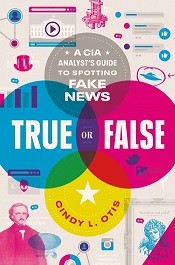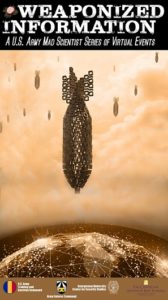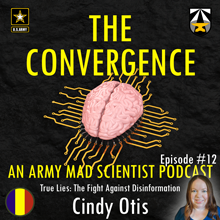[Editor’s Note: Mad Scientist Laboratory is pleased to announce our latest episode of “The Convergence” podcast, featuring Cindy Otis, former CIA officer, national security commentator, disinformation and cybersecurity expert, and author of True or False: A CIA Analyst’s Guide to Spotting Fake News. Please note that this podcast and several of the embedded links below are best accessed via a non-DoD network due to network priorities for teleworking — Enjoy!]
 In this latest episode of “The Convergence,” we talk with Cindy Otis, a disinformation expert specializing in election security, digital investigations, and messaging. She is a non-Resident Senior Fellow at the Atlantic Council’s
In this latest episode of “The Convergence,” we talk with Cindy Otis, a disinformation expert specializing in election security, digital investigations, and messaging. She is a non-Resident Senior Fellow at the Atlantic Council’s  Digital Forensic Research Lab. Prior to joining the private sector, she spent a decade as a CIA officer, serving as an intelligence analyst, briefer, and manager. Her regional expertise includes Europe and the Middle East. Ms. Otis is the author of the forthcoming book True or False: A CIA Analyst’s Guide to Spotting Fake News, to be published on July 28, 2020 by Macmillan Publishers.
Digital Forensic Research Lab. Prior to joining the private sector, she spent a decade as a CIA officer, serving as an intelligence analyst, briefer, and manager. Her regional expertise includes Europe and the Middle East. Ms. Otis is the author of the forthcoming book True or False: A CIA Analyst’s Guide to Spotting Fake News, to be published on July 28, 2020 by Macmillan Publishers.
In this episode, we discuss the role of technology in accelerating the spread of disinformation; its increasing use by state, non-state, and commercial actors; and the vital role an educated population has in implementing effective intervention tactics and counter-measures. Some of the highlights from our interview include the following:
-
-
- Disinformation and propaganda have been a part of the information landscape for a long time, but the current news focus sometimes creates a misconception that it is a new phenomenon. The tools and tactics that organizations use might change with the creation of new media, but the patterns and messages are the same throughout the historical context.
-
-
-
- Because fake news and disinformation are not new phenomena, there are actions that can be taken to defend against it and people can be armed against it. People should feel hopeful that there are actions they themselves can take to become a first line of defense against fake news.
-
-
-
- People should also have a feeling of responsibility that they are part of the solution in being more conscientious about what information they consume and what they share.
-
-
-
- The number of players involved in creating, disseminating, and amplifying disinformation will keep increasing as countries and groups see how effective and successful others currently are at using disinformation as a tool or weapon.
-
-
-
- More foreign governments will be getting involved, but commercial entities will also move into the space as “disinformation-for-hire” with troll farms and black PR firms.
-
-
-
- Most organizations, from DoD to non-profits, are similar in that they do not have a deep enough capability to look at the issue of disinformation. There need to be far more people trained in disinformation investigation and analysis.
-
-
-
- Disinformation investigation often looks for the same trends and patterns from previous years, while disinformation actors have learned from those trends and become ever more sophisticated.
-
-
-
- We need to pay more attention to the actual solutions of how we minimize the risk of disinformation with different intervention tactics, instead of only looking for current threat actors and trends.
-
-
-
- Education plays a huge role in defending against disinformation, especially with organizations providing training to both consumers and journalists to consider information and use OSINT tools.

-
Stay tuned to the Mad Scientist Laboratory for our next podcast with Molly Cain (founder of GovCity, former DHS Director of Venture, and entrepreneurship expert) addressing talent management, leadership, and innovation on 25 June 2020!
If you enjoyed this post, check out:
Influence at Machine Speed: The Coming of AI-Powered Propaganda, by MAJ Chris Telley
The Death of Authenticity: New Era Information Warfare
What We are Learning about the Operational Environment
Insights from the GEN Z and the OE Livestream Event
LikeWar: The Weaponization of Social Media
>>> REMINDER 1: Mad Scientist wants your Information Warfare Vignettes! We launched this crowdsourcing exercise to complement our Weaponized Information Virtual Events and we want to hear from you! Review submission guidelines on our flyer here, then craft and submit your most innovative and insightful visions of information warfare to us at: MADSCITRADOC@gmail.com. The winner of our writing contest will be present at our virtual conference on 21 July 2020. Deadline for submission is 1 July 2020!
 >>> REMINDER 2: The Mad Scientist Initiative will facilitate the fourth webinar in our Weaponized Information Virtual Events series next week, on Wednesday, 17 June 2020 (1300-1430):
>>> REMINDER 2: The Mad Scientist Initiative will facilitate the fourth webinar in our Weaponized Information Virtual Events series next week, on Wednesday, 17 June 2020 (1300-1430):
The Content Blitz: Quantifying the Islamic State’s Impact on the Saudi Twittersphere, with Henry Mihm, Inès Oulamine, and Fiona Singer, Georgetown University
Deplatforming, Deconstructed. A Typology for Technology Platforms, with Maddox Angerhofer, Kristina Cary, Bilva Chandra, and Ido Wulkan, Georgetown University
In order to participate in this virtual event, you must first register here [via a non-DoD network]. Registration is limited, so sign up now! And stay tuned to the Mad Scientist Laboratory for more information on our upcoming Weaponized Information virtual events!
>>> REMINDER 3: If you missed the first three webinars in our Mad Scientist Weaponized Information Virtual Events series — no worries! You can watch them again here.



